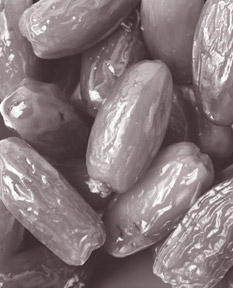Pakistani date exporters and producers in Sri Lanka to enhance
bilateral trade
A trade delegation of date producers and exporters has arrived in Sri
Lanka from Pakistan to enhance bilateral trade and to introduce the
Pakistani date varieties in the Sri Lankan market.
During their stay in Sri Lanka, the delegation will hold meetings
with the Sri Lankan fruit and dry fruit importers as well as other
stakeholders to explore the possibilities of enhancing bilateral trade.
In Pakistan, dates are cultivated since time immemorial. Some 5,000
years ago seed stones were found in storage bins excavated in Mohen Jo
Daro, in the Indus Valley which is considered as one of the oldest
civilisation of the world.

The date is an important fruit in Pakistan. It is the third largest
fruit grown after Mango and citrus. Pakistan falls in such an
agro-ecological region, where dates are grown on a large scale with
superior quality. Pakistan is ranked as the second largest exporter and
fourth largest producer of dates in the world.
This fruit is grown on more than 80,000 hectares with production at
more than 6.5 million metric tons annually.
Pakistan is exporting its dates to more than 30 countries around the
world such as USA, China, India, UK and Germany etc and holds important
position in the world's date trade. Pakistan's dates enjoy top position
in terms of quality in the market for several countries including USA,
China, Nepal, India, Canada and Denmark.
The annual quantity of dates exported per year is about 90,000 metric
tons.
The products Pakistan export are soft dates, dry dates, half ripe
dates as daug or rutab, dates blacks, pelted dates with almond and
khewnuts.
Presently Pakistan is holding 11% share of the world date production.
Pakistan is the second largest trading partner of Sri Lanka within
the South Asian region.
The level of bilateral trade between Pakistan and Sri Lanka increased
as a result of the Free Trade Agreement (FTA). Trade between the two
countries increased from US$ 150 million to over US$ 300 million during
the last three years, as it doubled within a short period of time with
the positive support gained from the FTA.
Bilateral trade between the two countries strengthened as reflected
by an increase in the number of products imported from and exported to
Sri Lanka such as fish, meat, vegetable, foliage, plant, sugar,
biscuits, pastry, cakes, mineral products, fibre boards, leather and
leather-based products, footwear, gems, jewellery, value-added copper
products, electrical items, bicycles, boats, and floating structures.
There was a great demand for Pakistani produce such as cotton yarn,
fabrics, potatoes, pharmaceutical products, knitted or crocheted
fabrics, articles of iron and steel, galvanized pipes, rice, fish,
seafood, textile articles, articles of apparel and clothing accessories,
rods of refined copper etc.
Sri Lanka was the first country to sign a Free Trade Agreement (FTA)
with Pakistan.
FTA between Pakistan and Sri Lanka is operational from June 12, 2005.
Under FTA, Sri Lanka and Pakistan have agreed to offer preferential
market access to each others' exports by way of granting tariff
concessions.
Sri Lanka enabled to enjoy duty free market access on 206 products in
the Pakistani market, while Pakistan, gained duty free access on 102
products in the Sri Lankan market.
The aim of a free trade agreement is to reduce barriers, to
facilitate exchange so that trade can grow as a result of
specialization, division of labour, and most importantly via comparative
advantage.
Items in the zero duty list of Pakistan include frozen fish,
vegetables, spices, fruits/juices, polymers of vinyl chloride in primary
forms, natural rubber, raw silk, tanned/crust skins, wool, some
varieties of paper and board, carpet and floor covering, non-alloy
aluminum, iron and steel products and toys/dolls.
Sri Lanka's zero duty items under the FTA include chickpeas, dates,
oranges, benzene, toluene, apparel and clothing accessories, ball
bearings, penicillin/streptomycin/tetracycline and their derivatives and
vacuum flasks.
The two brotherly countries have also signed a Bilateral Investment
treaty in December 1997, which came into force in January 2000 after
ratification.
In addition a memorandum of understanding between the Board of
Investment of Pakistan and the Board of Investment of Sri Lanka has also
been signed in February 2007 for strengthening of cooperation in all the
sectors of investment of both countries.
This MoU provides support to the enterprises on both sides and
encourages them to invest in both countries. The two Boards of
Investment also practise sharing of information on investment policies
and projects and encourage exchange of expertise.
The civilisational links between Pakistan and Sri Lanka date back to
the dawn of Buddhism.
The archaeological sites in Taxila, adjacent to Pakistan's capital
city Islamabad, are a living testimony to this fact. |

